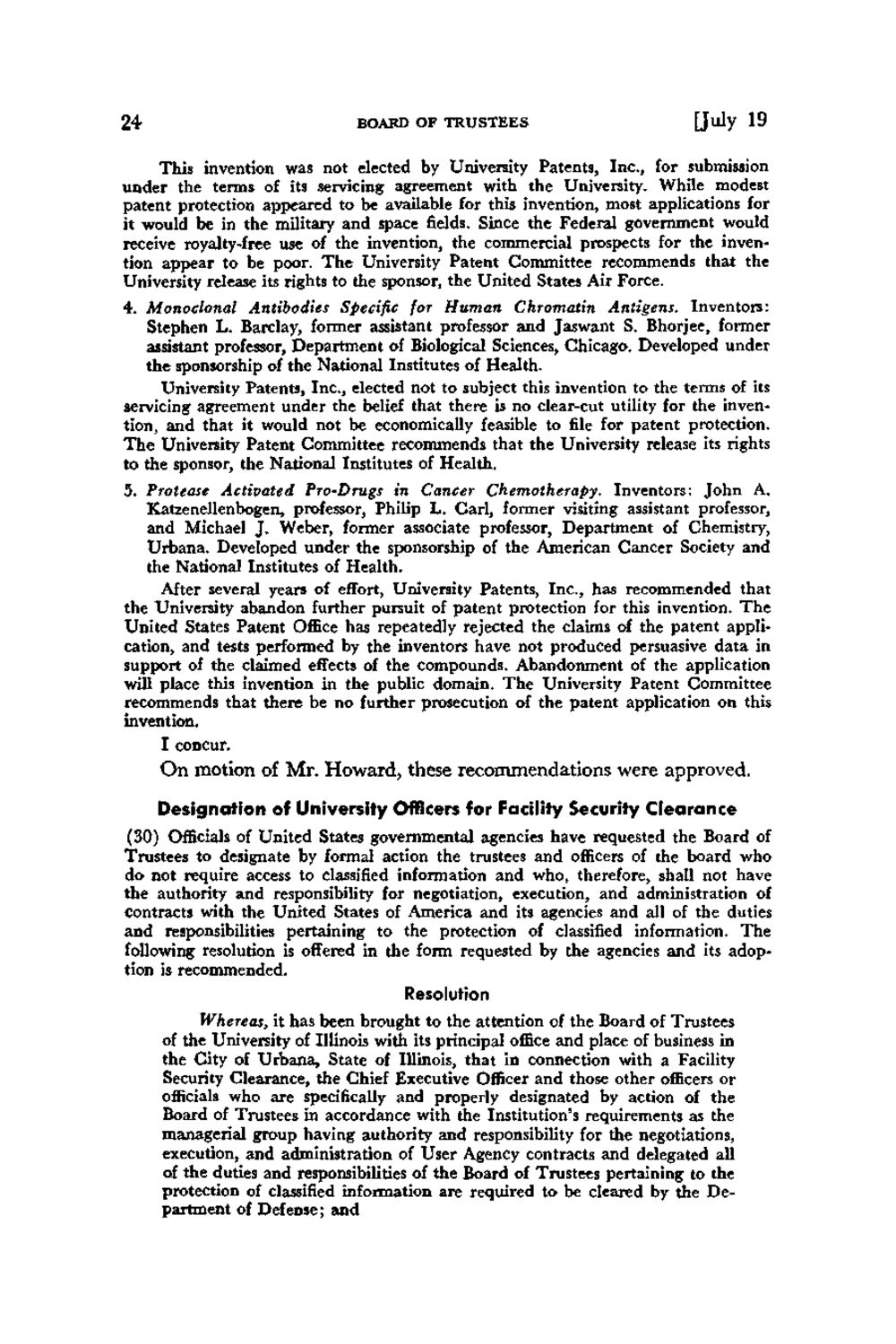| |
| |
Caption: Board of Trustees Minutes - 1986
This is a reduced-resolution page image for fast online browsing.

EXTRACTED TEXT FROM PAGE:
24 BOARD OF TRUSTEES [July 19 This invention was not elected by University Patents, Inc., for submission under the terms of its servicing agreement with the University. While modest patent protection appeared to be available for this invention, most applications for it would be in the military and space fields. Since the Federal government would receive royalty-free use of the invention, the commercial prospects for the invention appear to be poor. T h e University Patent Committee recommends that the University release its rights to the sponsor, the United States Air Force. 4. Monoclonal Antibodies Specific for Human Chromatin Antigens. Inventors: Stephen L. Barclay, former assistant professor and Jaswant S. Bhorjee, former assistant professor, Department of Biological Sciences, Chicago. Developed under the sponsorship of the National Institutes of Health. University Patents, Inc., elected not to subject this invention to the terms of its servicing agreement under the belief that there is no clear-cut utility for the invention, and that it would not be economically feasible to file for patent protection. T h e University Patent Committee recommends that the University release its rights to the sponsor, the National Institutes of Health. 5. Protease Activated Pro-Drugs in Cancer Chemotherapy. Inventors: John A. Katzenellenbogen, professor, Philip L. Carl, former visiting assistant professor, and Michael J. Weber, former associate professor, Department of Chemistry, Urbana. Developed under the sponsorship of the American Cancer Society and the National Institutes of Health. After several years of effort, University Patents, Inc., has recommended that the University abandon further pursuit of patent protection for this invention. T h e United States Patent Office has repeatedly rejected the claims of the patent application, and tests performed by the inventors have not produced persuasive data in support of the claimed effects of the compounds. Abandonment of the application will place this invention in the public domain. T h e University Patent Committee recommends that there be no further prosecution of the patent application on this invention. I concur. On motion of Mr. Howard, these recommendations were approved. Designation of University Officers for Facility Security Clearance (30) Officials of United States governmental agencies have requested the Board of Trustees to designate by formal action the trustees and officers of the board who do not require access to classified information and who, therefore, shall not have the authority and responsibility for negotiation, execution, and administration of contracts with the United States of America and its agencies and all of the duties and responsibilities pertaining to the protection of classified information. The following resolution is offered in the form requested by the agencies and its adoption is recommended. Resolution Whereas, it has been brought to the attention of the Board of Trustees of the University of Illinois with its principal office and place of business in the City of Urbana, State of Illinois, that in connection with a Facility Security Clearance, the Chief Executive Officer and those other officers or officials who are specifically and properly designated by action of the Board of Trustees in accordance with the Institution's requirements as the managerial group having authority and responsibility for the negotiations, execution, and administration of User Agency contracts and delegated all of the duties and responsibilities of the Board of Trustees pertaining to the protection of classified information are required to be cleared by the Department of Defense; and
| |